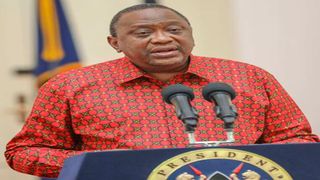
President Uhuru Kenyatta.
| PSCUNews
Premium
Pandora papers: President Kenyatta calls for audit of all secret offshore accounts
The release of the Pandora Papers, linking a number of high-level individuals to secret offshore accounts and properties, yesterday reignited debate on the role of tax havens where the rich stash their wealth.
President Kenyatta, whose family has been linked to billions of shillings stashed in foreign banks, says the “Pandora Papers and subsequent follow-up audits will lift the veil of secrecy and darkness for those who cannot explain their assets or wealth”.
The leaked report alleges that the President’s family is linked to 13 offshore companies holding more than Sh3.3 billion. The report did not disclose the sources of the funds nor impute wrongdoing of any kind on the account holders. Nothing under Kenyan law prohibits any citizen from owning property or bank accounts outside the country.
The only exception is that the Constitution prohibits State officers from holding undisclosed bank accounts outside the country. In this case, the Papers did not disclose whether the accounts are in the President’s name.
The Guardian reported that the papers expose the secret offshore affairs of 35 world leaders, including current and former presidents, prime ministers and heads of state.
Other world leaders named in the document dump are former British Prime Minister Tony Blair and his wife Cherie Blair, Gabon’s President Ali Bongo Ondimba, Jordan ruler King Abdullah II, Denis Sassou Nguesso (President of the Republic of the Congo), Patrick Achi (Prime Minister of the Ivory Coast), Jim Muhwezi (security minister of Uganda), former Prime Minister of Mozambique Aires Ali and the Prime Minister of Czech Republic Andrej Babiš.
$100 million
According to the files, King Abdullah II has amassed a secret $100 million property empire in the UK and the US. President Bongo, the exposé reveals, controlled two shell companies, which have since closed, in the British Virgin Islands.
In the Czech Republic, the investigations reportedly tied Prime Minister Babiš to a $22 million estate near Cannes, France. Local media say the leader has denied any wrongdoing.
According to the Pandora Papers, one the biggest leaks of financial secrets in history touching on powerful leaders across the world, President Kenyatta and six of his family members have owned a network of offshore companies for decades.
The Pandora Papers — comprising 12 million files — were leaked to the International Consortium of Investigative Journalists (ICIJ) and shared with more than 600 reporters and media organisations around the world.
They reveal that the first family’s offshore investments, including a company with stocks and bonds worth Sh3.3 billion ($30 million), were found among hundreds of thousands of pages of administrative paperwork from the archives of 14 law firms and service providers in Panama and the British Virgin Islands (BVI) and other tax havens.
The papers reveal an expensive home the Kenyatta family owns in an exclusive neighbourhood in the United Kingdom.
Financial transparency
The documents also show that a foundation called Varies was set up in 2003 in Panama. The foundation named Mr Kenyatta’s mother, Ngina, 88, as the first benefactor, and President Kenyatta as the second benefactor, who would inherit it in the event of her death. The purpose of the foundation and the value of its assets are unknown.
UBP private wealth advisers also helped Mr Kenyatta’s brother, Mr Muhoho Kenyatta, to set up an entity in Panama called Criselle Foundation in 2003. The foundation was registered to the offices of Alcogal in Panama City, and was nominally run by board members from the Panamanian law firm. It was set up for the benefit of Mr Muhoho, with his son Jomo Kamau Muhoho as successor.
A search of public records in BVI and Panama found that most of the companies linked to the Kenyattas are now dormant, some of them as a result of non-payment of regulatory fees.
Kenyans took to social media to react to the information with comments.
President Kenyatta, in a statement released by State House spokesperson Kanze Dena, said the leak “would go a long way in enhancing financial transparency and openness required in Kenya and around the globe.”
He promised to respond to the leak comprehensively upon his return from his State Visit to the Americas.
“The movement of illicit funds, proceeds of crime and corruption thrive in an environment of secrecy and darkness. The Pandora Papers and subsequent follow up audits will lift that veil of secrecy and darkness for those who cannot explain their assets or wealth,” President Kenyatta said.
A report by an American think tank, the National Bureau of Economic Research (NBER), last year revealed that Kenya’s super-rich were holding more than Sh5 trillion in offshore tax havens across the world.
Another international report released in 2007 detailed how a corrupt network in the Moi administration looted at least Sh130 billion and stashed it abroad, including in the United Kingdom and South Africa.
The report by risk advisers Kroll and Associates was commissioned by the then President Mwai Kibaki’s administration.
Colossal amount
The 110-page report published online detailed how people close to Mr Moi set up shell companies, fronts and secret trusts to siphon away Kenyan taxpayers’ money, which they stashed in banks, real estate and companies in an estimated 30 countries around the world.
With the return of the over Sh1 trillion, the owners of the cash have effectively ‘cleaned’ their wealth and evaded any questions on the cash source or any tax liabilities that may have been due in the years before they made the declaration.
The colossal amount has, however, not made a visible impact in the economy, raising questions on where the cash has been kept.





